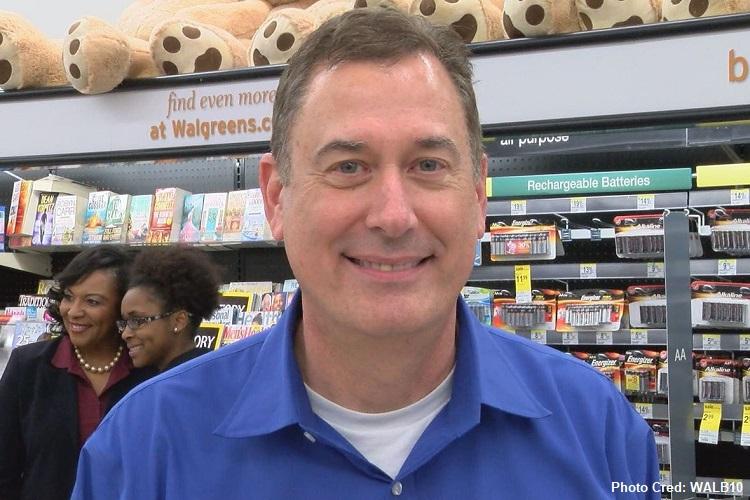Meet Midland's Meteorologist

Get to know Midland's Meteorologist, Bruce Jones as he shares some facts about himself, his expert knowledge, and advice for National Preparedness Month.
Bruce “Cyclone” Jones
Education: University of Missouri-Columbia - BA in Radio/TV/Film and BS in Meteorology
Hometown: I was an Air Force kid, so we lived all over the place; but I never lived anywhere I didn’t love. Small towns or large, foreign or domestic, you are as happy as you make up your mind to be.
Years with Midland: 10
What led you to Midland: I have been promoting NOAA Weather Radio since I started my broadcast career more than 40 years ago. I tell people, “If you live in the United States of America, and you don’t have a NOAA Weather Radio, see a psychiatrist.” I was very successful promoting NOAA Weather Radio when I was on one television station. Now I work with dozens of TV stations across the country to get out the message: NOAA Weather Radio Saves Lives.
Moment/why you decided to study meteorology: At age five I watched “The Wizard of Oz” and that began my fascination with tornadoes. I still read lots of books and research articles about tornadoes and severe local storms. In my lifetime our knowledge of how tornadoes form has grown exponentially, but we are still missing some very basic knowledge of the tornado formation process, so the quest is ongoing.
Most memorable storm: I lived in Rapid City, SD during the flash flood of 1972. Rapid Creek flooded shortly after the ten o’clock news, after people had turned off their TV’s and gone to bed. If those folks along the creek had weather radios, they would have gotten the warning and many could have been saved. My father was director of operations at Ellsworth AFB and coordinated the base response to the tragedy. As frequently happens in major disasters, our military and National Guard do incredible work helping communities and families get back on their feet.
Favorite weather for personal enjoyment: I enjoy watching thunderstorms build up and put on their show. Much life-giving rain comes from these storms, but they can also cause trouble. Everyone needs to know a little bit about them, and keep abreast of the forecast, especially in severe weather season.
Favorite weather to report on/study: America has more tornadoes than any other place on the planet. This is due to our location midway between the warm equator and the cold north pole, an enormous flatland in the middle of the country, and a north-south mountain range called the Rockies that focuses a lot of moisture, energy, and wind right onto the prairies. It is exciting to see the ingredients for a tornado outbreak come together several days in advance, to forecast its arrival on a certain afternoon, and then keep people safe with timely warnings and information. In television or radio, a severe weather day gives you an opportunity to truly serve your community.
Favorite resources for checking weather: When I started in broadcasting the only way we could see radar was to get cable installed into the studio and lock into the Weather Channel, so we did. I wrote a letter to the Federal Communications Commission and asked permission to wire NOAA Weather Radio through our control board so we could re-broadcast NOAA watches and warnings directly via our FM and AM stations. We quickly became the #1 station in town by a huge margin. That’s when folks started calling me Cyclone Jones. Back then National Weather Service bulletins would also print out on a teletype wire machine, which would “ding-ding-ding” multiple times when a weather bulletin was coming across. It was very exciting during a severe weather day to have those tools at your fingertips. The weather wire dinging, the weather radio going off, the phone calls from the public and from storm spotters, a real adrenaline rush to orchestrate it all in order to keep the listeners safe. Nowadays, you can receive radar, satellite, and weather information on your phone…it’s amazing! Still, I caution folks to have a NOAA Weather Radio because when the cell system gets clogged or it fails completely, you must have a more reliable source of information or you’ll be at the mercy of the storm. Multiple sources of weather information - that’s what will save your life.
Favorite way to spend your free time: I read a lot; mostly science or humor stuff. I bike and I enjoy time with my family. The great thing about working at Midland, if there are severe thunderstorms in the area, I don’t have to rush into a TV or radio station to alert the public. Now I am the public, and I can watch the storms put on their show.
Best preparedness tip: When I was on TV I told my daughters, “During severe weather I will not have the time to call you and tell you to turn the TV on. That’s what your weather radio is for.” I have a NOAA Weather Radio on each floor of my house and my kids know what to do when it goes off. If you want to make a difference in someone’s life, give weather radios as birthday, wedding, and anniversary presents. I honestly believe that every home, school, and business in America should have one of these devices.


